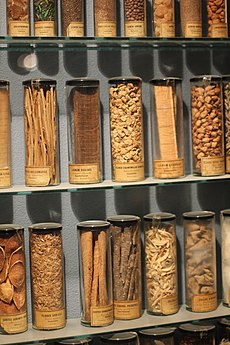
Back تداوي بالأعشاب Arabic Herboloxía AST Žuolininkīstė BAT-SMG Билкарство Bulgarian উদ্ভিদজাত ভেষজ Bengali/Bangla Herbologia Catalan Llysieuaeth feddygol Welsh Pflanzenheilkunde German Ettar DIQ Herbokuracado Esperanto
| Part of a series on |
| Alternative medicine |
|---|
 |

Herbal medicine (also called herbalism, phytomedicine or phytotherapy) is the study of pharmacognosy and the use of medicinal plants, which are a basis of traditional medicine.[1] With worldwide research into pharmacology, some herbal medicines have been translated into modern remedies, such as the anti-malarial group of drugs called artemisinin isolated from Artemisia annua, a herb that was known in Chinese medicine to treat fever.[2][3] There is limited scientific evidence for the safety and efficacy of many plants used in 21st-century herbalism, which generally does not provide standards for purity or dosage.[1][4] The scope of herbal medicine sometimes includes fungal and bee products, as well as minerals, shells and certain animal parts.[5]
Paraherbalism describes alternative and pseudoscientific practices of using unrefined plant or animal extracts as unproven medicines or health-promoting agents.[1][4][6][7] Paraherbalism relies on the belief that preserving various substances from a given source with less processing is safer or more effective than manufactured products, a concept for which there is no evidence.[6]
- ^ a b c "Hard to swallow". Nature. 448 (7150): 105–6. July 2007. Bibcode:2007Natur.448S.105.. doi:10.1038/448106a. PMID 17625521.
- ^ "This Ancient Chinese Remedy Helped Win the Nobel Prize". Time. Archived from the original on 3 November 2022. Retrieved 11 October 2021.
- ^ Su, Xin-zhuan; Miller, Louis H. (November 2015). "The discovery of artemisinin and Nobel Prize in Physiology or Medicine". Science China Life Sciences. 58 (11): 1175–1179. doi:10.1007/s11427-015-4948-7. ISSN 1674-7305. PMC 4966551. PMID 26481135.
- ^ a b Lack CW, Rousseau J (2016). Critical Thinking, Science, and Pseudoscience: Why We Can't Trust Our Brains. Springer Publishing Company. pp. 212–214. ISBN 9780826194268.
- ^ Cite error: The named reference
cruk-herbswas invoked but never defined (see the help page). - ^ a b Tyler VE (31 August 1999). "False Tenets of Paraherbalism". Quackwatch. Archived from the original on 11 November 2009. Retrieved 29 October 2016.
- ^ Cite error: The named reference
quackwatchwas invoked but never defined (see the help page).